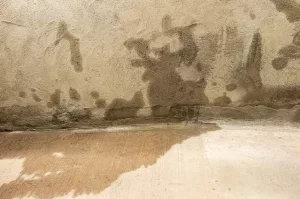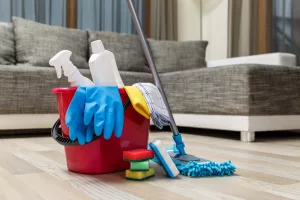Sometimes. Read on to find out why:
Let me start by saying that there is something wrong with every house. Nothing is ever perfect. Not a new house, not an upgraded one, not an original one. The best maintained house will still have something wrong with it in almost everyone’s eyes (including the seller’s). So there are some questions you need the answers to before you freak out about something hidden.

Does it Matter?
The first thing you need to know about a defect (the fancy term for something being wrong with a property) is if it is important or not. If this issue is serious, it is called a material defect. If it is not serious, it is immaterial – meaning it doesn’t matter. Some examples of material issues are flooding in a basement, a leaking roof, the fact that the house used to be a marijuana grow operation; Things that would affect the value and usefulness of the property.
So if the house has some stains on the ceiling tiles in the basement, or a leaking faucet, are those material? Of course not. A seller does not have to tell you anything about small issues that a home has. After all, there is something wrong with every house, remember? Little things don’t count. Only things that would affect you in a big way are considered material defects. Things that would cost a lot of money, ruin your enjoyment of the house or be a huge problem to fix. A dripping kitchen tap is not expensive, peeling wallpaper is not going to ruin your life. We’re only interested in big problems, here.
Is it Still A Problem?
So what if a basement used to flood, but the seller fixed the problem. Maybe the seller installed weeping tile and a sump pump and the basement hasn’t leaked since. Do they have to tell you about it? Nope. The thing is that the problem was fixed. Problems that are fixed are not problems anymore. If someone had to tell you about all the things that used to be broken and weren’t anymore, a real estate listing would be 10 pages long. If it ain’t broke – it ain’t broke. Nothing has to be mentioned.
Is it Hidden?
So now we get to the important part. If this problem is a material defect and it hasn’t been fixed, the seller still might not have to mention it. Why would that be, you might ask. Well the problem only has to be mentioned if it is hidden. This is called a ‘latent defect’. If the problem is not obvious, then you as a buyer wouldn’t know it’s there. So if the back yard has a nuclear power plant behind it and you just never bothered to look out the kitchen window or take a stroll around the neighbourhood, you’re not going to be blaming a seller for that, are you? Buyers still need to do a little poking around of their own to make sure they see everything that might be important before they buy.
Did the Seller Know About it?
Lastly, the argument could always be made that the seller didn’t know about this material latent defect. If you don’t know something, you can’t possibly disclose it. Take for example a case where there was mold growing under stucco in a condo. The seller sold it not knowing about the problem – well you can’t expect that the seller would have known if it was all covered up the whole time. It’s not as if they were opening the walls while they were living there, right? This rule about hidden or latent defects would mostly apply to things that a seller actually tried to cover up. Things that no buyer would easily discover, but that they knew about. Maybe a seller had a garage built, though and never got permits. That could mean the garage has to be torn down because it violates zoning or isn’t safe. That would cost a lot of money. That is a defect, that is material, that is latent, and it was known about.
The Real Estate Council of Alberta has rules for REALTORS® – who must disclose known material latent defects to the buyers of properties as well.
The More You Know
All of this makes sense of course. Hiding things from people is wrong if they’re important. Making sure your home looks as good as possible and not mentioning the little quirks and issues is not really wrong. And at the same time – not knowing about something doesn’t make you a bad guy. The responsibility to look at a home carefully still lies with a buyer, too. It is always a good idea to hire the right professionals and get advice on your purchase. Don’t forget, houses are not cheap. Even if you found out something was being hidden from you, it’s not easy to make a seller pay for your repair. Get an inspection, ask questions first and be sure to take a very good look around. You might be surprised at what you find!
[divider]
by +Alan F Macdonald REALTOR® | Copyright © – gimme-shelter.com
[10010]


Hi,
I have a question. I bought a pre manufactured home in April 2015. I got a home inspection done on it before I bought it. Everything seemed to check out ok with the home inspector with the exception of 1 small thing that can easily be fixed. However, I noticed in my shed/walk in workshop(approx. 300sq ft) that is attached to my home that the roof is leaking. Water is running down the walls in 4 different spots. The seller never disclosed anything to me about this. When the home inspector did the inspection he said that there was a musky odor that was present & I did smell the odor however the inspector said it was because the shed/walk in workshop was built on the ground, the wood was soaking up the moisture from the ground & didn’t have proper ventilation. Is the seller liable for this issue that was never disclosed to me? I’m also thinking there is issues with the electrical in the shed/walk in workshop as a result as one light will NOT work when it is damp/raining out but will work when it is dry out.
I am looking forward to your reply and knowledge on this issue.
Thanks
Rachel
Hi Rachel,
Sorry to hear about your problem with the workshop/shed. A seller must disclose things that are expensive to fix or cause a lot of trouble for a homeowner. If the space is not living space, it might not be considered dangerous or harmful, but if it is expensive to fix AND they knew about it, then it might be something that should have been disclosed.
The situation sounds a little complicated because of a number of factors. First of all, it sounds like the workshop was built after the house was built. So it’s an add-on. If the addition is connected to the house (that is, there is a door from the house to the addition, then it’s a pretty substantial addition. If the shed is just up against the house, then that’s a little different – it’s not really part of the house, then. So that might affect whether this is just a big shed that happens to be close to the house, or an addition to the house that should have been constructed better.
Now another thing is that you noticed a smell and so did the inspector. So you knew it was wet inside. And you bought the house anyway even though the shed had a leak. You thought the leak was down below, but it was from above. But it’s still wet in there and you were OK with that. And there were no further questions? You didn’t ask the seller about it at that time? I mean a leak is a leak. So if it was obviously wet inside, then it might not be something they would have to mention. This makes it look like you didn’t mind it being wet. Now we find out it’s MORE wet than you originally thought. How much wet is ok? That’s hard to know.
All of this adds up to whether it’s a big deal or not. It is expensive to fix? Could it be fixed with $1000? Or is the shed only worth $1000 anyway? Would you sue someone for this? These are the kinds of things you’d need to be able to answer. If it’s just a shed, it doesn’t sound like it would be worth it. Without seeing it all, I am not sure. Sometimes you can go to small claims court and get someone to pay to fix something like this, but I think they’re going to ask you why you didn’t ask about the musty smell. It doesn’t sound like they covered it up and it might have been obvious that it wasn’t well built and was leaking SOMEWHERE. So that’s not going to help your case. It would be good to check with your realtor and see what they think, and you can always check with a lawyer as well. It really sucks to get something and then find out it wasn’t what you thought. It happens all the time, but it really sucks. It’s just whether it’s worth fighting for that you need to figure out. I hope that helps a bit.
Alan